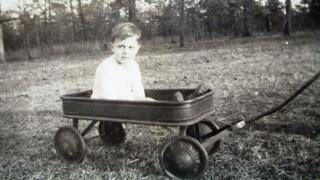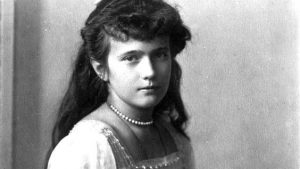Have you ever thought you were different or had people tell you you were different? Have you ever done things that seemed weird to others? As the first person diagnosed with autism, Donald Gray Triplett had these experiences. As a young child, his parents noticed he was highly intelligent, but also disconnected from the world. Donald always stayed to himself, and it seemed like he never wanted physical contact with other people. Mary and Oliver, his parents noticed that he could memorize bible verses and recite the alphabet in reverse order, but he always wanted to be alone. Donald’s rising behavior issues and his parents bewilderment on how to handle him led them to seek medical help.1
In August 1937, Donald’s doctor classified him as an overly stimulated child and suggested a change of environment would be helpful. At the age of three, Donald was institutionalized. Upon arrival, Donald was separated from his parents to live in a facility that was “not made for children like him in mind.”2 As a confused child, he did not know what was going on. All he knew was that he was taken from his home and being placed somewhere strange. Donald’s time in the facility weighed heavily on him, and he faded away physically. While waiting for Donald’s return, his parents did not receive any news of his condition improving; instead, he got worse and stayed confined to himself even more. As they gave up hope, his mother described him as a “hopelessly insane child.”3

Tired of waiting for Donald to miraculously get better, in August of 1938, his parents took him home. However, instead finding comfort, their sadness was only magnified by his behavior. Every day, all Donald wanted to do was spin his toys and watch with fascination the different musical notes, numbers, and pictures of the states. To Donald, this type of play was the only thing that mattered; his parents were just another part of the scenery. His father stated that he appeared to be oblivious to everything around him, like he was living in his own little world. It did not show any affection for his parents. Life for Donald and his parents was hard and it continued to get harder each day. His parents were at a loss and didn’t know what to do. Things got worse as Donald started throwing intense temper tantrums if his daily routine was disturbed. He became unresponsive, and if someone called his name or asked him a question, he would not answer or give one word answers. A highly intelligent boy, Donald had a lot of issues in expressing himself.4
In October 1938, frustrated with the digression of Donald’s behavior, his dad asked Dr. Kanner, a psychiatrist at John Hopkins Hospital, for help.5 Donald’s dad wrote the doctor a thirty-three page letter describing in detail every action and emotion Donald displayed.6 Dr. Kanner met Donald for the first time in Baltimore in 1938. He noticed that Donald did not acknowledge him but moved straight to the toys. This led him to try something different, something that might finally get Donald to react with some emotion. Dr. Kanner poked Donald with a pin to evaluate whether Donald showed any reaction toward the pain. Donald’s reaction was telling. Dr. Kanner could see that Donald did not like the pain, but he did not care any more or less for the doctor, because he was indifferent to what was going on. Dr. Kanner believed Donald could not attach the pain to the person who inflicted it. Throughout his visit with the doctor, Donald was indifferent to the doctor’s presence as if he was just furniture in the room. After two weeks, Dr. Kanner eliminated schizophrenia, a disorder he originally suspected Donald had. Finally, four years later, he wrote to Donald’s mother to inform her that Donald had autistic disturbance of affective contact.7 Nobody could to change the fact that Donald had this disorder. His autism led Donald to experience anxiety and sensitivity to sound, as well as to have learning disabilities. His actions and words were repetitive, and he had trouble understanding people’s emotions. The only option for Donald was to take it a day at a time as he found support through life’s challenges that came with this diagnosis.

Today, Donald leads a normal life coping with his autism. He lives alone in his childhood home. He still has issues socializing, but he came out of his shell to drive and golf. And, in 1957, he even pledged a fraternity, Lambda Chi Alpha, which surprised lots of people. Donald has traveled to 36 countries and 28 U.S states.8 Donald proved he would not let his autistic disorder keep him from living life. People with autism still face stigmas today. Donald stands as a hero, he faced numerous obstacles. Even while coping with autism, he was able to still live his life. Have you ever thought you were different or had people tell you, you were different? Have you ever done things that seemed weird to others? Everyone faces these questions in their life, and at some point, everyone can say that they have felt different before. Donald illustrates how to not let your difference define you. Any life is worth living no matter the difference and disorder.
- Kimberly Maich and Carmen L. Hall, Autism Spectrum Disorder in the Ontario Context: An Introduction (Toronto: Canadian Scholars Press, 2016). ↵
- John Donvan and Caren Zucker, “Autism’s First Child,” Atlantic 306, no. 3 (October 2010): 81-82. ↵
- John Donvan and Caren Zucker, “Autism’s First Child,” Atlantic 306, no. 3 (October 2010): 82. ↵
- Christine D. Shoop, “Examining Maternal Psychological Recollections of Children Diagnosed With Autism Spectrum Disorders,” PhD diss., Walden University, 2016, ↵
- Britannica Biographies Encyclopedia, 2012, s.v. “Triplett, Donald Gray,” by Richard Pallardy. ↵
- John Donvan and Caren Zucker, “Autism’s First Child,” Atlantic 306, no. 3 (October 2010): 85. ↵
- John Donvan and Caren Zucker, “Autism’s First Child,” Atlantic 306, no. 3 (October 2010): 85. ↵
- John Donvan and Caren Zucker, “Autism’s First Child,” Atlantic 306, no. 3 (October 2010): 88-89. ↵



49 comments
Sebastian Azcui
Stories like these are really interesting and this article is really well written with lots of details. Back in those times medical advancements were really slow as they did not have too much technology and knowledge. Having a mental disability in those times must have been really hard as doctors do not know how to treat it and do not know why it happens. Now a days people with Autism or other disabilities can have treatments and doctors know how to treat them.
Maranda Avina
Great article! Back then it is crazy that they would just institutionalize someone for having a disease. Mental Illness was not seen as a disease but it really is. Autism is very close to my heart, many people i know including my stepbrother are dealing with it themselves or someone who is autistic. It can be difficult and hard sometimes to understand someone who is dealing with this disease but by being there for them and aiding them, we are helping them cope and deal with this disease. We can help live their best normal life as much as possible.
Javier Camacho
I think while Autism is something that can feel like the end of the world for someone can be seen as totally opposite to everyone else. I find it amazing how Autistic children all have such a high capacity for what they are doing and their everyday activities. I know many people who are Autistic and are very intelligent as well. And if it weren’t for their somewhat erratic behavior then you would probably never be able to tell that they were Autistic. I feel very proud of Donald for being such a brave person and overcoming his anxiety to travel the world like he is!
Kasandra Ramirez Ferrer
In 1937 society was a time were anything different or stuff we didn’t understand was labeled as bad or wrong, this includes people who today we can tell if they have some kind of illness were treated like they were crazy and misunderstood. Autism is one of these diseases, thankfully today is treated as it should be and now people who have it can have a normal life and interact with people without being treated unfairly.
Diamond Estrada
Being the first person diagnosed with autism- Donald had to face a lot of criticism and isolation. I find it hard to believe that at the age of three years old- due to his conditions, he was institutionalized and isolated from everybody, at just three years old! It makes sense as to why his conditions were worsening, they were treating him like a criminal as a toddler. Having read most of these medical articles- it is sad to see what people had to deal with upon asking for help.
Elizabeth Guardiola
It is also fascinating to see the point of view behind had towards mental illness before they were established. I empathize with the parents of Donald, it must have been difficult seeing their child struggle and having no idea why or how to help. However, Donald has been an inspiration to many. Nowadays, people with Autism are able to live their lives just like everyone else. Although it took years for Donald to lead a normal life, he paved the way for all Autistic children to come.
Brianna Ramos
It’s crazy to think that in 1937 if anyone exhibited signs that were not “normal” the normal thing to do was to institutionalize them. It’s especially sad and frustrating to read the story of Donald because of the age he was institutionalized and the treatment he experienced. Although Donald’s family and doctors had no idea he had autism, the infuriating part is that they automatically assumed insanity was the cause at the age of 3! I understand that some of Donald’s actions and inactions were worrisome, but his family and doctors should’ve recommended to continue to observe Donald and adapt to his liking.
Ilse Amaya
It’s very unfortunate that Donald Gray had to go through his autism without any guidance or knowledge about his condition. It must’ve been very difficult and traumatic going through what he went through at his early stages of life. I am glad he is able to live a normal life coping with his autism. At the end of the day that is the goal regarding everyone who has a mental illness, to get better and adapt to society the best they can. A lot of people who have autism have different ways of coping with it and socializing with others. It’s up to others to respond and include autistic people into their life.
Liam Morrison
Back in those days, disabilities, whether physical or mental, were a lot harder to identify than they are today. Fortunately in todays day and age we know so much more and it is much easier to spot. Autism affects millions of people and thankfully him being diagnosed has not only helped himself, but has helped millions of other people all around the world cope better with their disability.
Charli Delmonico
I can’t imagine how sad Donald must have been at age 3 to be taken away from his parents and everything he knew to go to some institution where he just continued keeping to himself. It’s good that they finally were able to understand what was really going on with him, rather than just treating him like he chose to be unresponsive. I find it really awesome that he was even able to join a fraternity and be around lots of other guys! He really did overcome so many obstacles in his life, so I’m glad he is receiving recognition for it.